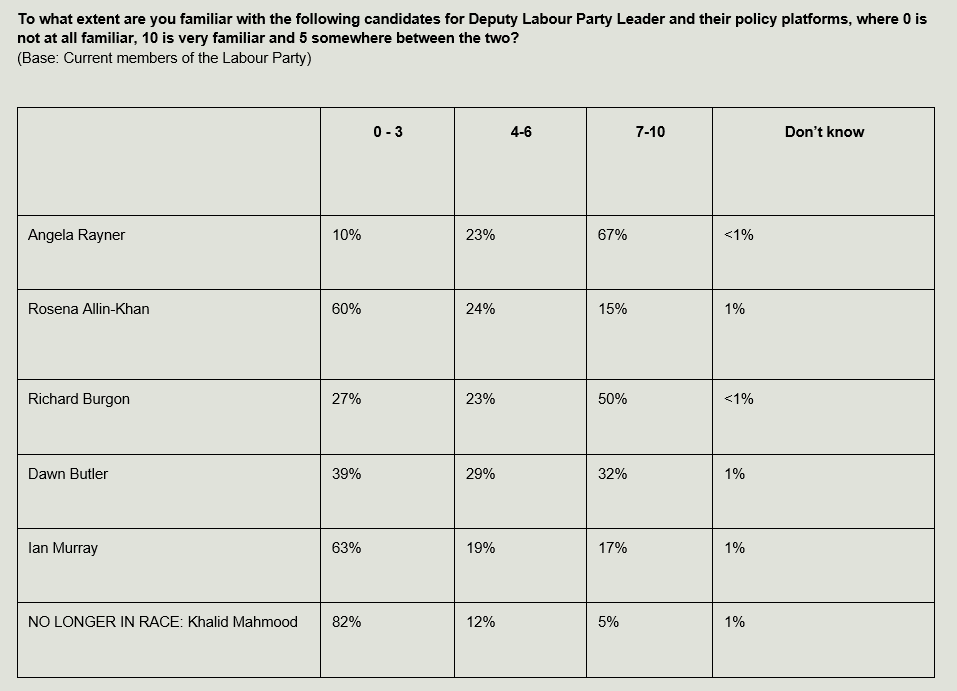
Labour Leadership Race – An Early Look At Labour Member Views:
A recent poll of Labour Party members on behalf of LabourList has found that the Labour leadership race is an open contest, although the race for the deputy leadership is currently much more one-sided.
At this early stage, 34% of respondents said they were currently undecided as to which candidate they were likely to vote for in the leadership contest at this stage, with 41% saying the same for the deputy leader race.
Many candidates were less familiar to respondents (details below) and the results should be taken in that context. Labour Members are a key cohort of those eligible to participate in Labour’s Leadership Election vote. Later in the contest, polling will consider the views of Trade Union affiliated supporters and the (as yet unknown) views of newly registered supporters.
When asked to rank the standing candidates in order of preference, Rebecca Long Bailey is narrowly more popular than Keir Starmer – with 42% selecting the former and 37% the latter. No other candidate comes close on the first preference (the poll included Clive Lewis who then subsequently stood down).
While Rebecca Long Bailey is the most popular first ranked candidate, Jess Phillips is the most ‘disliked’ with 50% ranking her last. Rebecca Long Bailey is then the most divisive candidate with 27% ranking her last. Excluding Clive Lewis, Lisa Nandy is the most popular second choice and joint with Emily Thornberry for most popular 3rd choice.
Rankings per candidate
(Base: Current members of the Labour Party who know the candidate they will vote for)

When looking at where people’s second preferences go, Keir Starmer is the candidate who gains most with three fifths of those who selected Lisa Nandy, Jess Phillips or Emily Thornberry first then selecting Keir Starmer second. Rebecca Long Bailey only gains from those who selected Clive Lewis first.
2nd preferences by 1st preference choice

Amongst the group who said they were undecided, Keir Starmer and Rebecca Long Bailey are neck and neck with 35% ranking Starmer first and 34% doing the same for Long Bailey.
Among those who said they knew who they would vote for, only 32% said they were completely certain their preferences (10 out of 10) wouldn’t change.
Deputy contest
In the contest for the deputy leader position, Angela Rayner is the clear favourite with 60% selecting her as their first preference, taking her above the required 50% threshold. Richard Burgon is the next most popular with 19% selecting him first and Dawn Butler is the most popular second choice with 29% selecting her second. Ian Murray has the highest percentage ranking him last (39%) followed by Burgon on 31%. The poll also included Khalid Mahmood who like Clive Lewis subsequently dropped out.
Rankings per candidate
(Base: Current members of the Labour Party who know the candidate they will vote for)

The rankings of the deputy leader candidates are less fixed with 50% placing themselves between 7 and 10 on the 0-10 scale and only 18% specifically saying 10.
Familiarity with the candidates and their policy platforms
Respondents were asked on a 0-10 scale how familiar they were with the candidates and their policy platforms. Keir Starmer has the most well known policy platform with 77% of respondents putting 7-10 on the 0-10 familiarity scale. Emily Thornberry has the lowest percentage selecting this score (37%) but excluding Clive Lewis, Lisa Nandy has the highest percentage saying they are unfamiliar (24% selecting 0-3 on the 0-10 scale).

Knowledge of the deputy leaders’ policy platforms are lower than for the leaders. Angela Rayner has the highest familiarity rating with 67% selecting 7-10 on the 0-10 familiarity scale, Richard Burgon is second with 50%. Out of those still standing, Ian Murray and Rosena Allin-Khan are the least well known with 63% of respondents selecting 0-3 for Ian Murray and 60% for Rosena Allin-Khan.

Survation surveyed 3,835 Labour members between 8th and 13th January 2020 via LabourList’s email distribution database. Data were weighted to the profile of party members by age, sex, and UK region, with targets derived from Labour membership composition data, 2016.
Full data tables and methodology can be viewed here and a summary presentation of this polling can be found here.
Survation is a member of the British Polling Council and abides by its rules.
To learn more about Survation’s polling capabilities or to commission a poll, contact Harry Mason or John Gibb on 020 3818 9661 or email researchteam@survation.com.
Would you like to have your own views represented in Survation’s research work?
To join our paid consumer opinion panel, simply go to: https://panel.survation.com/ and register (1 minute) and we’ll credit your account with 50 points for simply confirming your email and allocate 100 points for taking a very short survey. Points convert to cash which can be withdrawn each time you reach the equivalent of £50.
< Back

